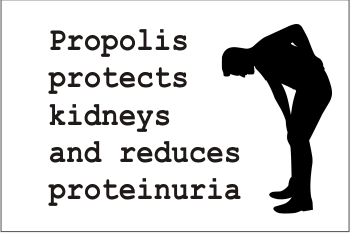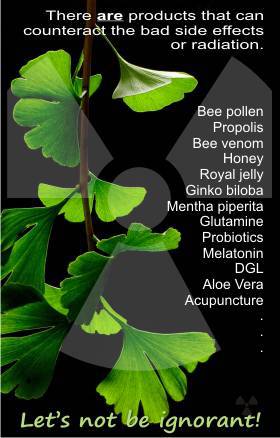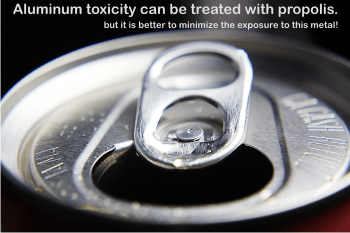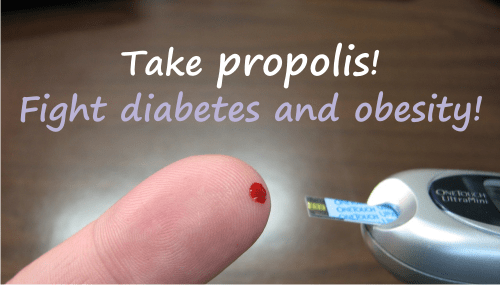Kidney problems are a real health concern worldwide. Proteinuria, the presence of excess proteins in the urine, is a recognized marker of glomerular injury and a marker of renal disease progression with higher cardiovascular risks. Reducing it is considered to be an extremely positive factor for the management of chronic kidney disease.
Propolis, a natural resin produced by bees from plant materials, has anti-inflammatory, immunomodulatory, and anti-oxidant properties, and it was recently shown to have an anti-proteinuric effect.
• Propolis reduces proteinuria in diabetic and non-diabetic chronic kidney disease
In a 2019 study Silveira MAD and his team conducted a randomized, double-blind, placebo-controlled trial on the effects of Brazilian green propolis on proteinuria and renal function, in patients with chronic kidney disease and moderate renal dysfunction. The results showed that propolis significantly reduced proteinuria (the presence of excess proteins in the urine) in all cases of chronic kidney disease, either diabetic or non-diabetic and it was safe and well tolerated, without any side-effects.

There were 2 groups, one that took 500 mg/day (4 tablets of 125 mg each, divided into 2 daily doses) Brazilian green propolis and one that received placebo. The results were evaluated during and after 12 months of treatment.
During the whole period, patients received their standard treatment for the control of their comorbidities: the baseline dosages of ACE inhibitors, or ARBs and antihypertensive drugs for blood pressure control.
The evaluation was done first at baseline, then every 2 months for the first 6 months, and every 3 months for the next 6 months.
After month 2, the difference between the two groups, in terms of the mean level of proteinuria, started to be evident and became significant by month 6.
After month 12:
– proteinuria was significantly lower in the propolis group than in the placebo group — 695 mg/24 h (95% CI, 483 to 999) vs. 1403 mg/24 h (95% CI, 1031 to 1909); P = 0.004
– there were not significant differences in blood pressure or eGFR between the propolis and placebo group.
– there was a reduction in albumina (i.e., the mean UACR) in the subgroup of patients with chronic kidney disease caused by diabetes.
– there was no significant difference in plasma creatinine between the two groups. The researchers suggested that the 12-month observation period might have been too short to evaluate the progression of the disease through the measurement of creatinine, which has well-known limitations.
Propolis has a hypoglycemic effect and therefore the reduction in proteinuria occurred independently of significant variations in the glycemic index during treatment. Also, because creatinine levels remained stable throughout the treatment period, they also suggested that the antiproteinuric effect of propolis was independent of variations in glomerular filtration.
• Propolis was used as part of a medical device containing xyloglucan-gelose-hibiscus-propolis, which reduced bacteriological and symptomatic parameters in adults with uncomplicated UTI.
The medical device was created by Costache R.C. and his colleagues and it was used in a study to investigate its potential as a mucosal barrier protector and urinary acidifier. The safety and efficacy of this device were investigated as adjuvant therapy to first-line antimicrobials for treatment of uncomplicated urinary tract infection (UTI) in adults. (study)
In this multicentre, randomised, parallel group, double-blind, phase IV study, xyloglucan + gelose or placebo were administered orally in combination with an antimicrobial agent (e.g., ciprofloxacin) for 5 days, then alone for 5 days, then beginning on day 30 of the study for 15 days per month for 2 months.
The results showed:
– reduced uroculture positivity (defined as a bacterial count ≥103 CFU/mL) from 100% of patients at baseline to 0% at Day 11, with recurrence in 3 patients (15%) by day 76;
– reduced frequency of urinary incontinence and urgency of micturition compared with placebo;
– it was safe and well tolerated.
• Red propolis protected kidney against acute ischemic renal failure

In the study “Red propolis ameliorates ischemic-reperfusion acute kidney injury.”published in 2015, Da Costa MF and his team from Brasil investigated red propolis potential as a protection in renal I/R injury and showed that red propolis protected kidney against acute ischemic renal failure and this protection was associated with reduced oxidative stress and eNOS and heme-oxygenase up regulation.
The study was done on male Wistar rats, which underwent unilateral nephrectomy and contralateral renal I/R (60 min). I/R increased plasma levels of creatinine and reduced creatinine clearance (CrCl), and red propolis provided protection against this renal injury.
The results showed that:
– Compared to the group of rats submitted to ischemia (without propolis treatment), red propolis significantly improved oxidative stress parameters.
– Semiquantitative assessment of the histological lesions showed marked structural damage in I/R rats compared with those treated with red propolis.
– RP attenuated I/R-induced endothelial nitric oxide-synthase down regulation and increased heme-oxygenase expression in renal tissue.
Propolis prevents injury and improves morphology in chemotherapy
• Propolis prevents kidney injury and improves kidney morphology in methotrexate toxicity.
The study from 2015 conducted by Hasan Basri Ulusoy from Turkey investigated the protective effect of propolis on methotrexate-induced kidney injury in rats. Methotrexate is one of the most widely used anticancer drugs, also used in some autoimmune diseases, with important toxic effects on many organs such as the kidney, liver, and bone marrow.
The treated rats received 100 mg/kg/day propolis (by oral gavage) for 15 days, starting 8 days before the methotrexate injection. Propolis prevented the rise in number of apoptotic cells (p = 0.017), HSP-70 (p = 0.000) expression, and improved kidney morphology.
Propolis was extracted using ethanol (96%) at room temperature for 1 week. To extract, 30 g propolis was dissolved with 100 mL ethanol. After extraction, the sample was filtered by paper filter and extract filtrated was evaporated to remove the residual solvent using a rotary evaporator at 40 °C. The dry propolis extract was diluted to 1000 mg/L in methanol and the mixture was filtrated with 0.2 μm microfiber filter prior to LC–MS/MS analysis.
The major compounds of propolis found were trans-caffeic acid, vanillin, and chrysene. Other major compounds were apigenin, naringenin, rhamnetin, quercetin, p-coumaric acid kaempferia, and hesperidin.
(more on the composition of propolis)
• Propolis decreases the toxic effects of irinotecan
A similar study was done for irinotecan, another chemotherapeutic drug with cytotoxicity and genotoxicity in normal cells.
In the study the mice were given a dose of 100 mg kg−1 body weight for three consecutive days before the irinotecan administration.
Propolis preparation and related flavonoids were found to exhibit an important immunomodulatory effect and could decrease irinotecan-induced toxic and genotoxic effects to normal cells without effecting irinotecan cytotoxicity in EAT cells.
You may also be interested in other health benefits of propolis:
• Propolis prevents and treats aluminum toxicity. Remember this and minimize the exposure.
• Propolis treats otorhinolaryngologic and respiratory diseases
•Propolis: a natural treatment for oral health
• Propolis can prevent and treat LEUKEMIA and CANCER
• Is propolis antibacterial? Can it kill bacteria, viruses, fungi or parasites?
• How to take propolis tincture? Here is some folk medicine.
P.S. You will find extremely cheap products on the market. There is a reason for this price. Don’t fall for them, your health requires quality products.
Please leave a message if you had any experience with propolis.





